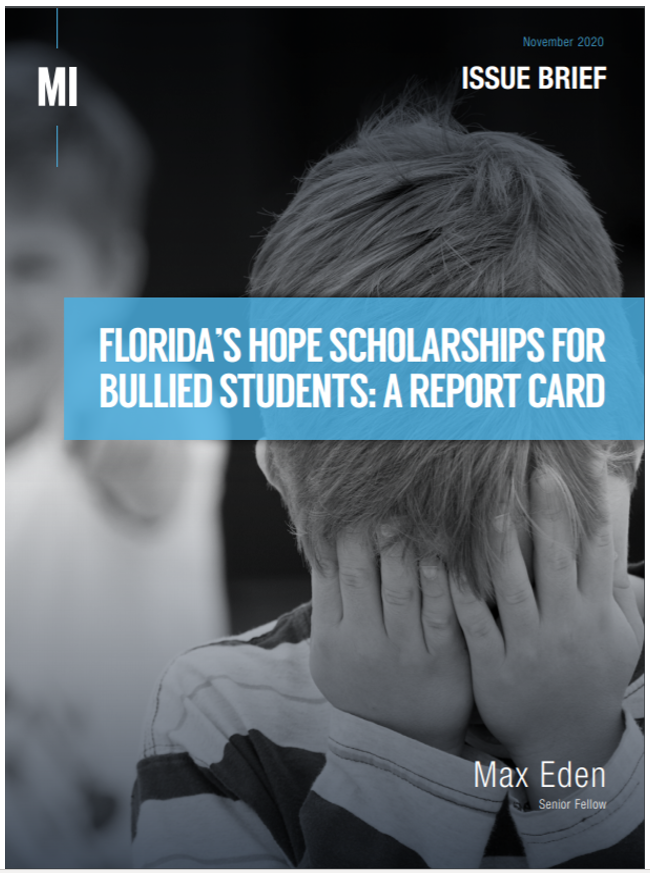 Manhattan Institute senior fellow Max Eden recently authored a report on the legislative origins and history of the first education choice program for students who have experienced bullying in public schools.
Manhattan Institute senior fellow Max Eden recently authored a report on the legislative origins and history of the first education choice program for students who have experienced bullying in public schools.
In the report, Eden wrote:
“Education reformers have long lamented America’s persistent racial and socioeconomic achievement gap and framed school choice as a means to provide low-income students of color trapped in failing schools with a ticket to a better education. Yet when parents who participate in school choice programs in states like Georgia or Indiana have been surveyed, at least half of them cite safety as a primary motivating factor.”
Eden familiarized himself with the subject of bullying in Florida public schools when he co-authored the book Why Meadow Died about the Parkland, Florida, school shooting. Why Meadow Died lays out a methodical case regarding the dozens of times a disturbed and violent public school student has been mishandled by school and police authorities before finally going on a murder spree.
In this new report, Eden more happily profiles a program designed to allow the victims of bullying to escape from their tormentors. He writes:
“The Speaker’s office noticed that they were receiving e-mails from parents who were upset at the school’s inability to protect their kids. Parents were saying, ‘This has been happening for years, and they do nothing. They just, at most, give the kid a detention or an in-school suspension and say, ‘That’s the most we can do.’
“Corcoran and his staff reviewed data from Florida’s School Environmental Safety Incident Reporting (SESIR) system, which showed 47,000 incidents in the latest reported year (2015–16) — a figure they felt certain represented only a small fraction of the total. They estimated that there could be as many as 100,000 victims of bullying and abuse. ‘We started brainstorming,’ Ochs says. ‘What could we do? There were already policies in place to address bullying. Maybe we could increase the penalties based on the number and type of an incident? Then a lightbulb just kind of went on for us: this fits with the school choice paradigm. We need to empower parents. They just want their kids protected, and that’s not always happening, so we need to give them the power to force the school’s hand or just get their kid to a safer environment.’ ”
The report quotes several families whose lives have been transformed by the program. One parent described their child as having previously been through “daily torture” while another described a public school whose discipline was so ineffective that that the family sought and received a restraining order from a judge.
In Year 2 of existence, the Hope Scholarship remains a small program. A lack of public awareness and a seeming unwillingness on the part of school district officials to follow the law seem to be contributing factors.
A spring 2020 survey of participating parents by Florida State University’s Learning Systems Institute found that about 70% of respondents learned of the Hope Scholarship on their own or from a third party, not from the school district that had a legal obligation to inform them of it. Some parents reported resistance from public school officials. According to one parent, “The school seemed very hesitant to give me the form. I had to go to the office and basically demand it and make them sign it.”
Another group of parents indicated that the school had refused to acknowledge that bullying had occurred. One parent indicated “the Hope notification form was a challenge because the principal and dean at [school name redacted] refused to acknowledge that the bullying was taking place. They refused to communicate with me in a timely manner. I had to make threats to go to the school board commissioner to get them to respond to the bullying issues.”
While Florida’s bullied children have access to a variety of education choice programs beyond the Hope Scholarship, the Florida Legislature should make this program more accessible. Expecting district school principals to investigate and acknowledge in writing that bullying may be occurring in their schools is unrealistic and is an obstacle that few families are able to overcome.
A program for bullied children would be substantially more useful if it were not so easily thwarted.